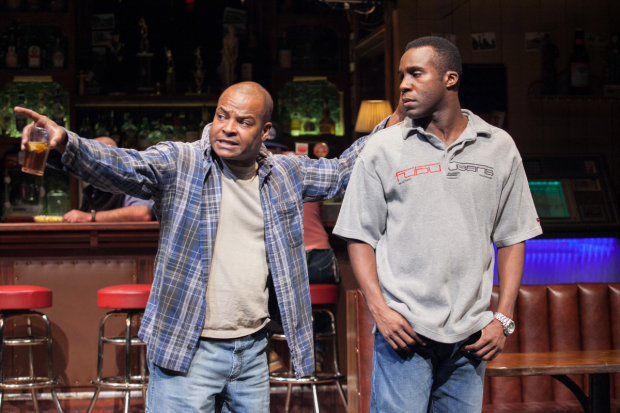
(© C. Stanley Photography)
Sweat is a brilliant, gritty look at the working class in American society at the beginning of the 21st century. Co-commissioned by Arena Stage and the Oregon Shakespeare Festival, Sweat is written by Lynn Nottage, who collaborated with the play's director, Kate Whoriskey, to interview inhabitants of Reading, Pennsylvania, in order to understand their jobs, their families, and the ruinous effect of the dissolution of the steel industry on their lives.
Sweat begins in 2008, when two friends, Jason and Chris, see each other for the first time since 2000, the year both were sent to prison for participating in an unnamed incident. After that, the play flashes back and forth between those times, revealing altered circumstances for the people of Reading who work in a metal tubing factory. In 2000, almost all of them are members of a union, employed in well-paying jobs. By 2008, many of the factories in Reading have closed. Jason's mother, Tracey, and Chris's mother, Cynthia, have been locked out of their factory. Tracey's husband, Brucie, who worked at another factory, has been out of work even longer than the women have. The play takes place in a bar tended by a fatherly figure named Stan, who worked in the plant, as did his father and grandfather, until he had an accident with a machine that left him unfit for factory work. When Chris and Jason get out of jail, however, they have very different attitudes. Chris has found religion behind bars and hopes to continue his education, while Jason finds himself on a harder road.
Tramell Tillman is impressive in the role of Chris, who is first seen as caring about nothing more that the latest footwear. Stephen Michael Spencer is equally fine in the role of Jason, who has gone another route in jail, covering his body with white-supremacist tattoos. Nottage's understanding of the boys' conflicting personalities is perceptive and fascinating. Kimberly Scott is outstanding in the role of Cynthia, who has spent her adult life "on the floor," working the machines in a room without air conditioning. Scott is particularly good at milking the dark humor in Nottage's script. Cynthia's best friend at the beginning of the play is Tracey, artfully played by Johanna Day.
Cynthia and Tracey's boozy friend, Jessie, is well portrayed by Tara Mallen. Jack Willis is excellent as the paternal Stan. Reza Salazar turns in a stellar performance as Stan's Colombian-American assistant, Oscar. Kevin Kenerly is excellent in the role of Brucie.
Whoriskey keeps the play moving at a brisk pace most of the time, although there is a serious stop in the action when Cynthia and Tracey's friendship breaks down. That fractured alliance mirrors the break-up of the closeness between both mothers and their sons, when the sons come home from jail to see that their mothers have fallen on hard times.
John Lee Beatty's set rotates to show the interior and exterior of Stan's bar. On the inside it is a super-detailed, anywhere-in-America bar, with a neon Crown Royal sign on the wall, a pay phone, barstools, and Naugahyde banquettes. Jennifer Moeller's costumes are the casual after-work clothes one would expect from that period: jeans and T-shirts for both men and women. Jeff Sugg's projections – briefly flashed on the set – clearly announce the year and month in which the action takes place, so there is never any confusion about the time changes involved.
Sweat does not come across as political theater, insisting that its audience take action, but it is impossible to watch the play without thinking about trends in the nation regarding unions and support for and against them. The play looks at unemployment both as a future possibility, when rumors of factory closings start to spread, and as a present event. The show also examines the effects of unemployment on a group of people, not just one character, increasing the sense that what is happening to America's working class has to do with large forces that manipulate lives and make it impossible for individuals to control their own fates.
In Sweat, Nottange, Whoriskey, and their ensemble deal smoothly and subtly with very complicated issues of power, money, class, and race, insisting that empathy must be given to these most American of characters who are at risk of becoming our new "have-nothings."








